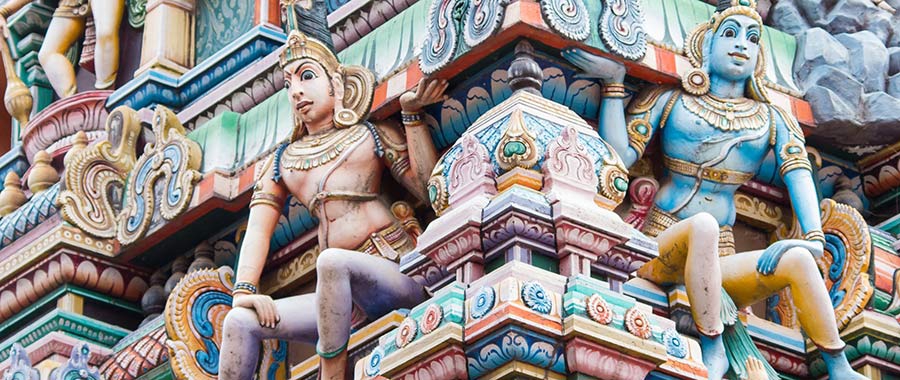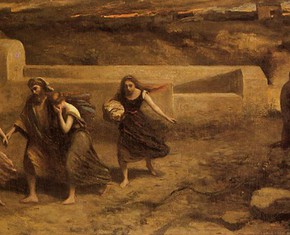The views expressed in our content reflect individual perspectives and do not represent the authoritative views of the Baha'i Faith.
Baha’u’llah claimed to be the “Promised One” of all religions. Kalki is popularly regarded in India as the future Avatar, the tenth incarnation of Vishnu. Baha’is in India proclaim Baha’u’llah as Kalki.
The three previous articles have provided information about this future savior. Kalki is also known as “Parasraya” in the Visnu Purana and “Visnuyasas” (“Fame of Vishnu” or “Glory of God”) in the Mahabharata, the Vayu Purana and the Harivamsa. The Hindu text that gives the fullest account is called the Kalki Purana.
Based on the information presented in the previous three articles, this would be a good time to reflect on the identification of Baha’u’llah as Kalki. Does this claim withstand scrutiny?
According to the Kalki Purana, Kalki’s mission appears to be to restore the Hindu priests back to power:
Thereafter, You will set out to conquer the entire world and in the course of that conquest, You will defeat many sinful kings who are representatives of Kali. You will also annihilate many followers of Buddhism and finally, You will entrust the responsibility of ruling the world to Devapi and Maru. I am fully satisfied just to know that You will perform these pastimes and so there is no need for any other daksina. When the principles of religion are re established, then people will perform sacrifice, give charity, and undergo austerity without impediment. – Kalki Purana 3:10–11, emphasis added.
We have seen that, in the Kalki Purana, Kalki’s first major victory was his defeat of the Buddhists. This is consistent with the broader history of India. During the medieval period India, the Brahmins made alliances with various kings to persecute Buddhists. This eventually led to the defeat of Buddhism in India.
Whether or not Kalki was actually a historical personage is an interesting question. Famed Indologist, K. P. Jayaswal argued that the Kalki Avatar was actually a historical king of the early sixth century, Visnuvardhana Yasodharma, defeater of Mihirakula, king of the White Huns of India. So, if Kalki was a historical personage, when (and how) did he become a future Avatar? Jayaswal explains:
Belief about Kalki’s futurity. The Kalki-Purana, in describing the life of Kalki, uses the past tense. The present, Hindu belief that Kalki is yet to come, is a recent development. … The belief about the futurity of Kalki in Northern India seems to have been a growth later than the 14th-century. – p. 148.
Even if Kalki was once a king in medieval India, the point here is that Kalki’s persecuting and defeating Buddhists is obviously sectarianism in its most violent form.
Kalki also defeated, then banished, the barbarians, or foreigners, or heretics (i.e. mlecchas). This is not an egalitarian social policy. Rather, it is the imposition, by force, of religious nationalism, reinforced by ethnic and religious prejudice. Obviously this is contrary to Baha’u’llah’s principles as well.
Baha’u’llah taught that the past messengers of God, one and all, were true. Baha’i doctrine clearly includes the Buddha as one of those messengers. Therefore, the exploits and conquests of Kalki, as told in the Kalki Purana, would be contrary to Baha’u’llah’s doctrinal teachings and ethical and social principles. Kalki is presented as a holy warrior, not as the bearer of wisdom. To his credit, however, Kalki was said to be versed in spiritual matters:
Suta Gosvami said: Upon hearing these words of Parasurama, Kalki became very pleased and immediately offered His respectful obesiances to Him. Thereafter, He began to study the Vedas under the direction of his spiritual master. Kalki mastered the sixty four arts under the tutelage of the son of Jamadagni. He also learned the Vedas, the branches of the Vedas, the Dhanurveda, and other departments of knowledge. – Kalki Purana 3:5–6.
If Kalki’s mission was to restore Brahmanism to its former power and prestige, then Kalki does not compare favorably with Baha’u’llah.
If, hypothetically, the religion brought by Kalki was conceived as a universal religion—with progressive teachings, egalitarian social principles, new social laws ethics and values—then an argument could be made for identifying Baha’u’llah as the advent of Kalki.
Baha’u’llah’s mission was to unify the world, through the power of his social, moral, and ethical principles. This included promoting world peace. The peace that Kalki achieved was based on conquest, and therefore was not a true peace.
Another of Baha’u’llah’s principles is the oneness of religion, and peace among religions as its expression in real life. The sectarianism and interreligious warfare that the Kalki Purana recounts obviously is contrary to Baha’u’llah’s teachings.
The Kalki Purana also regales in the conjugal delights of Kalki, who has many consorts (lovers). By contrast, Baha’i teachings promote control of one’s passions and monogamy. Krishna, of course, is also represented as an amorous lover, with numerous consorts. This has often been attributed spiritually as an allegory of divine love. So there is a way in which these narratives can find harmony on a higher plane of understanding.
Kalki, moreover, is neither dispassionate nor compassionate. One scene depicts Kalki as filled with rage (“inflamed with rage,” Kalki Purana 21:29). He is not presented as a paragon of virtue, worthy of emulation. So, in order to somehow identify Baha’u’llah as Kalki, this can only be done if the traditions regarding Kalki are radically reinterpreted, if not regarded critically.
On a popular level, proclaiming Baha’u’llah to be the advent of the Kalki Avatar serves as an “eschatological bridge” over which believers from Hindu background may cross in entering into the worldwide Baha’i community.
Prophecies point forward. They create expectations. But they are circumscribed by their historical and cultural and religious time and place.
Given these limitations, which are rather profound, the claim that Baha’u’llah is the fulfillment of the Kalki prophecies must be qualified and nuanced. The fact that Baha’u’llah did not literally fulfill the Kalki prophecies is actually for the better—because it means no war, no bloodshed, the advent of new spiritual teachings and new social laws, best suited for this day and age. Instead of promoting Brahmanism as the state religion (as Kalki did), Baha’u’llah promoted religious pluralism and peace among religions. The Universal House of Justice, an institution that Baha’u’llah created, wrote:
Religious strife, throughout history, has been the cause of innumerable wars and conflicts, a major blight to progress, and is increasingly abhorrent to the people of all faiths and no faith. Followers of all religions must be willing to face the basic questions which this strife raises, and to arrive at clear answers. How are the differences between them to be resolved, both in theory and in practice? The challenge facing the religious leaders of mankind is to contemplate, with hearts filled with the spirit of compassion and a desire for truth, the plight of humanity, and to ask themselves whether they cannot, in humility before their Almighty Creator, submerge their theological differences in a great spirit of mutual forbearance that will enable them to work together for the advancement of human understanding and peace. – The Promise of World Peace, p. 8.
In the next article in this “Figuring out Prophecy” Series, we will look at Krishna, who is another manifestation or Avatar of Vishnu, and explore the claim that Baha’u’llah is the return of Krishna.
You May Also Like
Comments

















"Unsheathe the sword of your tongue from the scabbard of utterance, for therewith ye can conquer the citadels of men’s hearts." (Epistle to the Son of the Wolf)
The reason was that they did not see the sun darken, or the stars of heaven fall to the ground, or the angels visibly descend upon the earth, and hence they contended with the Prophets and Messengers of God. (Gems of Divine Mysteries)
The beloved Guardian has identified Baha'u'llah with the tenth avatar and it makes a lot ...of sense as He is a Conqueror but of hearts and souls. And the Tenth Avatar is to destroy evil with the sword of truth not violence
Not clear what you mean by "regardless of facts." My faith is in complete regard for the facts. Those facts are simply put in perspective. Are you saying that, when it comes to prophecy, Baha'is have "blind faith"? If so, not so.
Surely you know that the Baha'i teachings frequently invoke the principle of the harmony of faith and ...reason. That's one of the major points of this "Figuring Out Prophecy” series, in fact.
You wrote: "It is entirely a matter of faith, not of objective facts." Not so fast! Baha'is from a Christian background, ...like myself, were persuaded by Baha'u'llah's Book of Certitude and by Abdu'l-Baha's explanations as well.